Sisters, 1973, directed by Brian De Palma, screenplay by Brian De Palma and Louisa Rose, story by Brian De Palma.
When is a travesty not a travesty?
When it's a De Palma movie.
Actually, the right answer is when the travesty succeeds on the same terms as its model, no matter how over-the-top and exaggerated it is. That's what makes Starship Troopers a parody of dumb action movies and an effective summer blockbuster; that's what keeps the soundtrack to This Is Spinal Tap on the shelves. And that's what makes Sisters so enjoyable to watch, even if it's a travesty of Psycho: it's also creepy and suspenseful in its own right. Here's Brian De Palma on his obvious debt to Hitchcock, circa 1973:
I have found that people who like and are knowledgeable about Hitchcock also like Sisters—they know the references I am making to his films and they seem to appreciate it all the more for that. Which is good, because you could so easily be attacked as a tawdry Hitchcock rip-off.
The question isn't whether or not Sisters is a tawdry Hitchcock rip-off, the question is, why does De Palma think that's an attack? Sisters is certainly tawdry: it's about siamese twins, one of whom has the unfortunate habit of stabbing men in the crotch with a chef's knife.
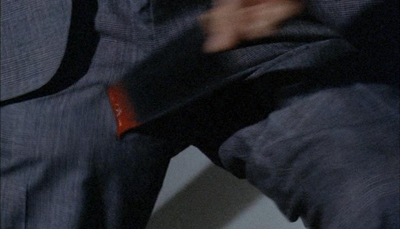
And it may be that De Palma learned to hide his debt to Hitch a little better as he got older, but Sisters contains entire sequences lifted entirely from Rope, Rear Window, and most obviously Psycho. He even got Bernard Herrmann to score it. So a Hitchcock rip-off: sure. But that doesn't mean this nasty little movie isn't a lot of fun.
"Fun" is not the same thing as "subtle," though, and anyone looking for a delicate touch would be well advised to steer clear. The first sequence isn't from Hitchcock, but from Penthouse Letters: Lisle Wilson plays a man changing clothes in the locker room when a blind woman stumbles in the wrong door and starts undressing. As luck would have it, that blind woman is Margot Kidder, who has somehow managed to combine nurse and schoolgirl fetishwear in one outfit:

"I never thought it would happen to me..." But Penthouse Letters wasn't racially charged; and remember, this is 1973: Martin Luther King, Jr.'s assassination was more recent than September 11th is today; the Boston bussing riots were still to come. Just as things are getting interesting, we pull back to reveal that we're watching a game show called "Clumsily Implicate the Viewer":
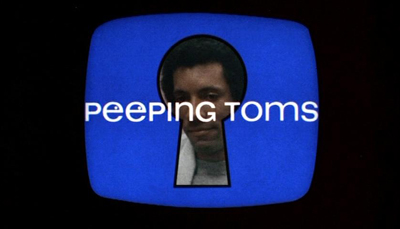
The show answers a pressing question we all face, many times a day: "What does a fella do when a pretty girl starts taking off ALL HER CLOTHES, right there in front of him?" It turns out the woman is an actress; the man is the victim of a Candid Camera type setup. The host introduces the couple (Philip and Danielle) to the audience and to each other and gives them their fabulous prizes: a set of cutlery for her:

And a free meal at an appropriate restaurant for him.
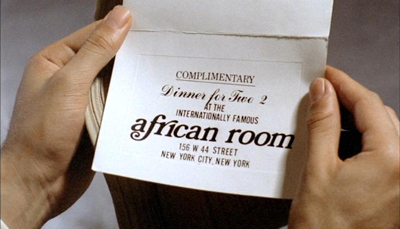
Danielle asks to come along for his dinner, and it is here that De Palma strays from the admirable subtlety he's displayed thus far. Here's the first shot of the restaurant's interior.
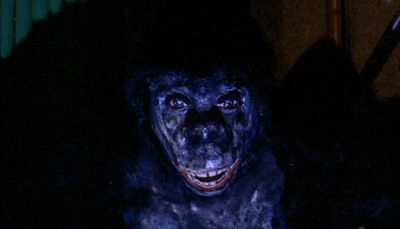
And in case that wasn't obvious enough, here's one from a little later:
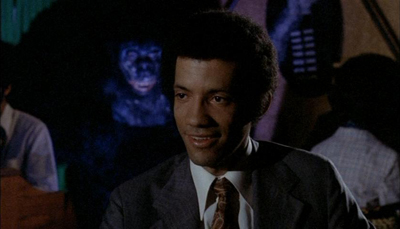
Won't someone protect our vulnerable white women?
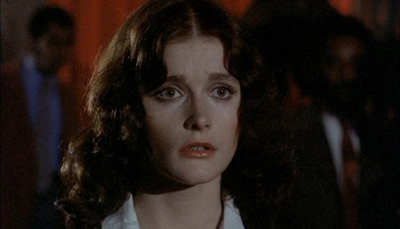
This is the point where you expect to hear someone behind you in the theater whisper "Perfectly dreadful!" in a voice that's just a little too loud. So, as with Wes Anderson, Caveat Emptor; you have to have a particular sensibility (in this case, a taste for over-the-top exploitation) or this won't be any fun for you. If that's your bag, though, De Palma has all kinds of sick sideshow pleasures in store. There's William Finley as Danielle's ex-husband, the sallowest man in the world:

There's Philip's fatal mistake; not that he has sex with Margot Kidder, but that he decides to buy her and her sister a birthday cake:
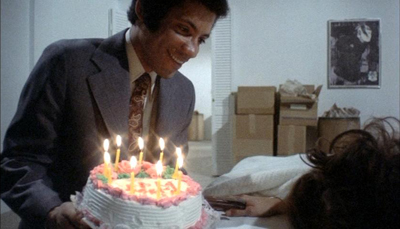
There's the fake red paint and bad prosthetics only found in the very best exploitation films:
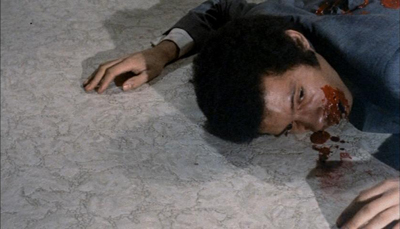
There's an imaginitive use of split-screen while William Finley cleans up the murder scene as the police draw near, like the grossest Mr. Clean ad ever made:
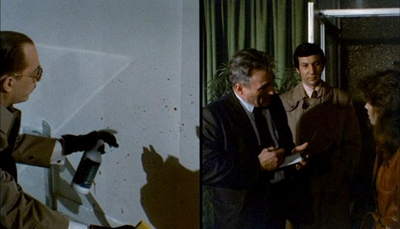
There's a mini-version of Rope that makes imaginative use of a sleeper sofa:
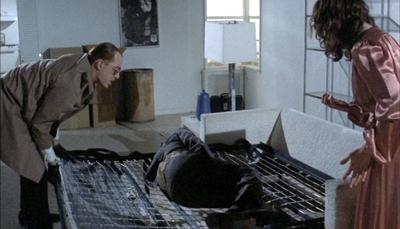
And that's not even the best Hitchcock recreation in the film. That award goes to De Palma's version of Rear Window, where the role of Grace Kelly:

Is played by (who else?):
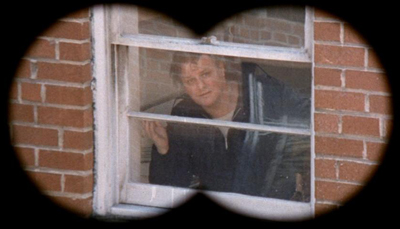
Charles Durning!

All that and I haven't even talked about the bulk of the film or introduced the main character, an intrepid girl reporter named Grace Collier, played by Jennifer Salt.
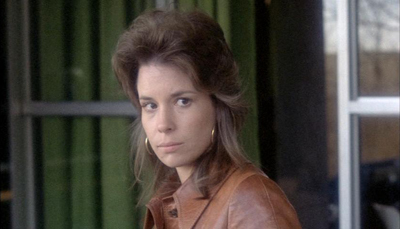
Her defining characteristic is a complete inability to get anyone in the world to take her at all seriously. Her mom is trying to marry her off to a veterenarian's assistant, her career has stalled ("I'm having lunch tomorrow with an 80-year-old ex-con who's just carved an entire replica of the Danbury Penetentiary out of soap," she complains) and her editor won't let her investigate the murder she's witnessed without hiring a private detective to babysit. Her counterargument in its entirety is "I know karate!" so you can kind of see where he's coming from; still, making her ride around in a van with Charles Durning solving mysteries seems a bit excessive.
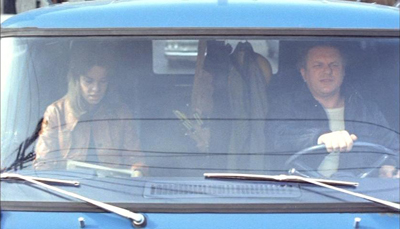
There's no talking dog, at least. Anyway, cataloguing the film like a freakshow makes it seem like a much worse movie than it is, because here's the thing: for all its crudeness, just about all of this movie works. The split-screen cleaning sequence is stylish, well-made, and tense; as much as De Palma telegraphs his surprise ending, there are still some twists that aren't predictable, and De Palma brings some things to the table Hitchcock didn't. A darker sense of humor, for one thing: not just morbid but politically charged. And a taste for squick. It's hard to imagine that North by Northwest or To Catch a Thief would have been improved by adding Robert Melvin, the Man with Two Faces or Sealo the Seal Boy to the cast, but they're right at home in Sisters.

The optical effect used in that shot is a low-budget version of the central effect in Dead Ringers—I think Cronenberg owes De Palma more than is usually acknowledged. They share a Swiftian disgust at the body, and Cronenberg is the only other director I can imagine finding quite so much monstrosity in the Lennart Nilsson photographs that run over the opening credits.
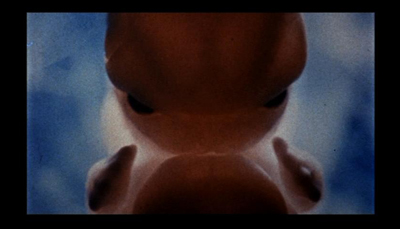
There's a complicated case you can make for Sisters as an exploration of voyeurism and Nabokovian twinning, as Bruce Kawin does here, but I think any such argument is going to be more complex and elegant than the film itself. It may be the case that De Palma's later work either justifies or requires that kind of defense; I haven't seen any of his other movies in years. De Palma himself seems to have bought that hype: about ten years after making Sisters, he told Martin Amis, "I use Hitchcock’s grammar but I have a romantic vision that’s more sweeping and Wagnerian." Well, none of that sweeping Wagnerian romance is on display in Sisters: it's a blunt instrument through and through, despite its gleaming knives and scalpels. Finding depth beneath its surfaces is gilding the lily, so long as you accept that the lily is a crude, blunt, sick, and terrifically fun exploitation film. Here's to tawdry Hitchcock rip-offs.
Randoms:
- De Palma, one-time science fair winner, comes at film from a perspective that's pretty alien to an English major/screenwriter like myself ("Unfortunately, most movies derive from a literary rather than a visual intent"). This probably explains why so few of his characters are three-dimensional. But it also means that there are a few scenes that would never work on the page, but succeed on film for strictly visual reasons. Here's one of the best: De Palma opens with this framing of Jennifer Salt being questioned by a police detective.
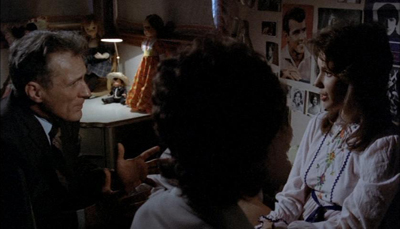
- She answers his questions kind of robotically, and then the camera starts tracking left:

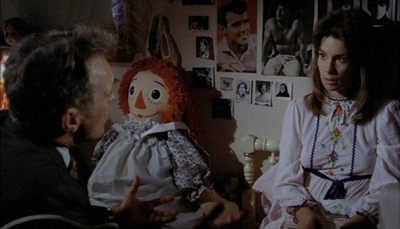
- Go ahead: try to write that joke out on the page in a way that's as creepy as the filmed version.
- De Palma got the idea for Sisters from a Life magazine article about Masha and Dasha Krivoshlyopova, Soviet cojoined twins. Here's the picture that got De Palma thinking:
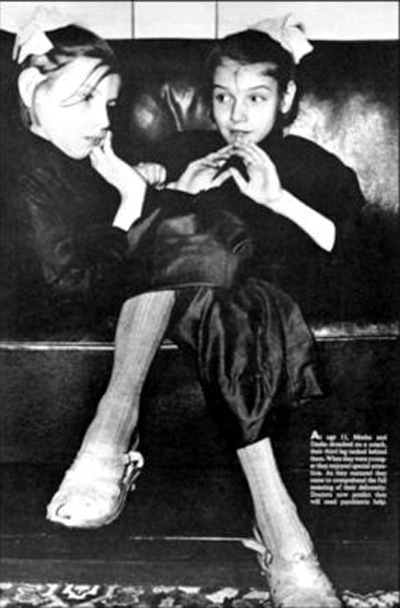
- One of the twins looks relatively happy, the other, relatively insane. It pretty much writes itself from there!
- De Palma tells the following story about working with Bernard Herrmann. After screening a rough cut, Herrmann complained:
"Nothing happens in this movie for forty minutes!" And I said, "Yes, that's the idea. There is a slow beginning—you know, like Psycho, where the murder doesn't happen until about 40 minutes into the picture." And he shouted at me, "YOU are not Hitchcock; for Hitchcock they will WAIT!"


20 comments:
It's hard to imagine that North by Northwest or To Catch a Thief would have been improved by adding Robert Melvin, the Man with Two Faces or Sealo the Seal Boy to the cast, but they're right at home in Sisters.
True—but don't forget, Saboteur gave us a Human Skeleton, a Fat Woman, a Bearded Lady, a midget—and a pair of bickering Siamese twins (not, I don't think, actually conjoined. Or Siamese).
When is a travesty not a travesty? Actually, the right answer is when the travesty succeeds on the same terms as its model, no matter how over-the-top and exaggerated it is.
I used pretty much the same definition with Hot Fuzz, which I found to be both a profoundly silly parody and a staggeringly serious 80's buddy-action movie.
Dan --
Sabateur is the one Hitchcock I'm always embarrassed for not having seen, so to the top of my Netflix queue it goes as well (however, given that my current Netflix movie hasn't been seen since I moved, it may be a while yet...)
Chuck,
I wouldn't defend his other movies as strongly, though the only one I've seen recently enough to remember was The Black Dahlia, which I don't think anyone would argue was his finest hour. Sisters is fun, though; it goes to eleven.
Olli,
I should have thought to mention Hot Fuzz; good example. Shawn of the Dead as well, and for that matter, Dawn of the Dead.
Ah, but which Dawn of the Dead? Romero's is a very different beast from Zack Snyder's.
Good write-up as always, but I feel like there's a bit more to this movie that's only brushed at. Hopefully without sounding too much like Pauline Kael, DePalma's movies (and Hitchcock's before him) really require a different way of viewing than most films. For one thing, while much of the movie isn't subtle, at the same time it is - like Hitchcock, DePalma learned to hide some of his best ideas in plain sight, merely by being so blatant in other aspects. It's an exploitation movie that has a greater mood of tragedy about it than most exploitation movies from the same period (although this was a pretty good era for that kind of thing) and it combines moods and emotions in ways that only DePalma can manage - the final shot is simultaneously an immense human tragedy, and a sick joke. And being able to be completely both of those things at the same time is a pretty solid achievement.
Also, I have a feeling this is the only American International picture in the Criterion Collection, which is some kind of distinction.
I've only seen the standard De Palmas: Scarface, Untouchables, and Mission Impossible. He may very well be the least subtle skilled director working. Most good directors use imagery to subtly enhance moods, De Palma bludgeons you over the head with them. He's a bit comparable to Suzuki Seijun, only he doesn't have a unique "grammar".
As for the Salt character, I admit, I would never take anyone seriously with that hair style.
Within the DePalma canon, Scarface, Untouchables, and Mission Impossible are three pretty minor works (with Carrie and Blow Out being my particular favorites). But I have to take particular issue with this: "Most good directors use imagery to subtle enhance moods" - I don't know that that's really true, and for a lot of the really cinematic directors, like DePalma, 'imagery' is the paramount concern. And I haven't seen a lot of Suzuki, but DePalma most definitely does have a 'unique grammar' that just doesn't shine through as clearly in his more mainstream studio films.
Jeff,
I saw the sick joke part of the last shot, and the tawdry Hitchcock rip-off part of it, but I missed the immense human tragedy—the characters in Sisters, especially Philip, don't seem enough like real people for me to feel much about them. I didn't feel worse for Philip than I did about the money in Psycho, and for pretty much the same reasons. That's assuming I understand what you're saying about the last shot.
I always forget about Carrie when talking about De Palma, for some reason. I really loved that movie, although, again, I haven't seen it since college.
Well, immense human tragedy is as immense human tragedy does. Philip isn't a particularly well-crafted character, but for me that final shot evokes a melange of feelings, a little hard to describe, but something along the lines of, "Where are we? Oh shit, Charles Durning is still following that damn sofa? I totally forgot that plot thread. That's funny. Actually, that's also really sad and pathetic" or something along those lines. It's more attention than Marion Crane gets after the car is finished sinking at the end of Psycho, for sure.
Typo alert:
**Hitchock** they will WAIT!"
**
Great to have you back!
Lew Saul
Matthew,
You've gotten me interested in this film. Its on my list now. Thank you for your eloquence.
You should see Femme Fatale. I have hated so many DePalma films, this one really kept me involved through the whole ride. And it is a ride. Ryuichi Sakamoto's score is luxurious and hypnotic, and DePalma's fetishistic visuals synthesize perfectly with it. This film has absolutely no camp or kitsch value, but it's narrative bends in on itself very provocatively. I would love to hear your response to it.
Shawn
Why yall niggas be all traipsy in shit wit ya language. Yall high-strung muthafuckas who can't kick that job interview rhetoric and get to a little more street vernacular.
See ya boi got a vocabulary too, but don't you see how sometimes it's just not needed it apes the flow of dialogue and tells the next cat he gotta big up his language go tit for tat on his comments and swing in the air if he wanna be heard.
U on some shock and awe shit with this literary ish, u market ya writin a bit too slavishly as it seems tho u do have substance u make an effort to flower that written word up^
Yes the kid is black and he knows wats good. you got ya mind right u just dont know how to act. on some real tho, i do indeed believe ima ape a few ideas u dropped on these pages, twist a couple oldies at rip em into some new ish and make me a script or two. word to mother, you could have made an incredible resource here.
my main gripe hangs on the fact that this rigid term paper style works to alienate a wider audience, limit a flow of thought between blogger and blogee and stands to brogg a sense of over-entitlement on the last say on the topic.
the only reason people can talk to ebert on how he's right or wrong is because he's famous enough that he's got their attention already, he's decisive in his critiques in worshipping or demonizing a work, he tends towards simple language when necessary (he knows what part of his review is targeting which audience) and he gives people solid popular frames of reference as to how to approach the film in question.
So yeaaaaaa...im done.
Pat,
See, I don't think term-paper style writing is necessarily an affectation. Certainly it's less of one than Black English or street patois or whatever would be, at least coming from me. But yeah, flowery language can hide sloppy thinking; see "Politics and the English Language," if you want a real critique of that. Of course, slang can hide sloppy thinking, too...
Anyway, to the extent I spend time on my writing style on this site, I'm trying to make what I'm saying tolerable to read, though I'm sure sometimes I would be better served by saying things more simply.
But if you get something useful out of this site and turn it into a script, that's all to the good, even if you have to wade through "job interview rhetoric" to get there. Send it my way!
I never think I've got the last say on any topic, though--as often as not I'm way off. That's what comments are for. Re: Ebert, his audience is wider than mine by design. I'm not trying to help a newspaper or television audience decide whether or not to see a film, I'm trying to figure out for myself how a particular film works or doesn't.
Lively up yourself,
Matt
Dan,
I saw Saboteur finally, last night. Loved the billboards and the Statue of Liberty scene. I don't think he uses the circus freaks quite the same way De Palma does, though, that's for sure—they're closer to Oz's munchkins or, for that matter, Saboteur's blind man; the kindness of weirdos or whatever.
What's the joke in the series of shot with the Raggedy Ann doll? I'm thick and I don't get it.
I found this blog post when googling for the cojoined twins, and I read this review. I have wanted to see the film for a long time, but haven't come around to do it - now I have to! Looks fabulous. Great review!
If only the Criterion Collection had more extras, documentaries, interviews, more nude Margot Kidder shots, commentary.
As for the movie itself, well if Hitchcock didn't exist, neither would this movie. And although I'm a fan of Bernard Herrmann the score in SISTERS sometimes became over the top and annoying.
The "flashback" dream sequence tried to hard to be surreal, nothing disturbing at all. Shitty acting and horrible forced French Accent by Margot.
But still a nice B-Movie thriller to watch when you are bored. Good for drunken Halloween parties!!
Tiako sez: "I've only seen the standard De Palmas: Scarface, Untouchables, and Mission Impossible."
Oh, you missed DePalma back when he was really interesting in the Seventies and early Eighties! PHANTOM OF PARADISE (a satire of the music industry and a pulp version of FAUST; OBSESSION combines Hitchcock's VERTIGO with even sicker (implied) sexuality, and a great early supporting performance by John Lithgow; the aforementioned CARRIE; and one of my all-time favorites for its sheer cinematic virtuosity, the telepathic-weapon thriller THE FURY (between it and SCANNERS, I wondered if he and David Cronenberg weren't engaged in a cinematic game of "Can You Top This?" - only to both get totally OWN!ed by John Carpenter's THE THING).
HOME MOVIES, DRESSED TO KILL, BODY DOUBLE and RAISING CAIN should be watched after these, because they feel like they're variations on a theme of his earlier, more engaged work - as is, I suppose, FEMME FATALE which I have yet to see.
In English, eng sara's spamming you!
Post a Comment